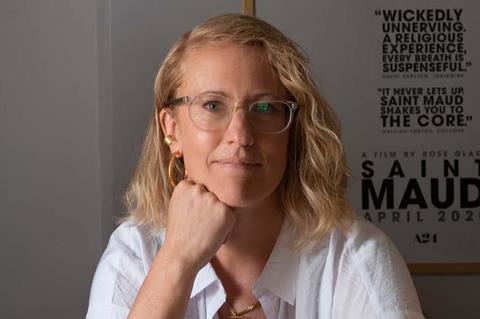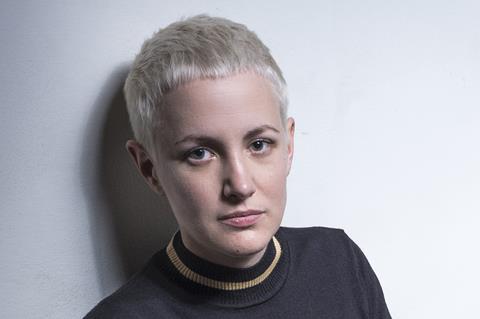The UK’s independent film producers are facing all manner of soaring costs in an industry transformed by the tumultuous arrival of the US streamers. Screen explores the impact on both rising and experienced producers, and what the cost could be to the entire UK film industry.
Producers in the UK have pushed the panic button about the state of the struggling indigenous independent film sector. Of nearly 20 producers who spoke to Screen International for this piece, all agreed UK indie film production has reached crisis point.
Covid-19 made everything more difficult — production costs increased by around 20%, but overall budgets did not grow with them. Cinema audiences dwindled and have yet to return fully. But the sector was in ill health before, and the pandemic just used up the last of the paracetamol.
“The level of passion and tenacity we have seen from producers through this period has been extraordinary, though we would much prefer producers were able to deploy this energy towards creativity and maximising success rather than crisis management,” says Eva Yates, director of BBC Film.
“The introduction of National Lottery funding for independent film in 1995 helped to transform the fortunes of the entire UK independent film sector,” adds Mia Bays, director of the BFI Filmmaking Fund. “I think similar transformative policies are needed now to address this urgent crisis.”
One meaty issue facing the sector is the cuts in funding to the British Film Institute (BFI), the backbone of the UK independent film industry. Its funding took a big hit when its 10-year strategy Screen Culture 2033 kicked in this year. The BFI Filmmaking Fund’s budget is around £18m ($22m) a year, compared to £25m ($30.5m) per year under the previous round of funding — a 28% drop.
What’s clear, as Bays said during a Cannes panel on the contracted fund, is that “we can’t be all the answers”. While acknowledging there has been a drop, Bays notes 40% of all BFI National Lottery funding has been allotted to UK filmmaking, and the BFI aims “to ensure the projects make as much impact as possible, with audiences and their careers, and ensuring we support our talent to protect their IP [intellectual property]”.
BBC Film and Film4 also offer development and production support, but their budgets are equally modest — BBC Film has £11m ($13.4m) a year, while Film4 has around £25m ($30.5m) per year.
So where else can producers go to raise finance? Private investment has become harder to come by. There has been a move towards a debt financing position, as opposed to equity. Financiers are asking for bigger percentages in return for their investment, doubling or in some cases tripling in amount in the past three or four years. And then, there are the streamers.
‘We’re just a service industry’

The UK industry has a complex relationship with the US streamers. “The early dialogue, particularly with Netflix, was very much about creative freedom and decent budgets,” notes Andrea Cornwell, producer of Rose Glass’s Saint Maud and the director’s upcoming Love Lies Bleeding. “Now, we’re finding out what happens when suddenly the kind of independent work the early model streamers were able to support is vanishing. They are getting more conservative with their commissioning.”
With more US streamers in competition in the market, they have become more aggressive in their tactics. They are hoovering up IP rights for handsome sums, which in turn leaves producers without any future benefits. Without IP, producers are unable to build a catalogue of work and thus establish themselves as successful global companies, in the footsteps of Heyday Films, Working Title, Aardman and See-Saw Films, or a UK equivalent of A24.
In TV, the issue of IP ownership for independent producers was addressed in the 2003 Communications Act, which required public service broadcasters to commission 25% of their programming from independent production companies and set out Terms of Trade that enabled these companies to hold onto their IP rights, allowing ‘super-indies’ such as All3Media and Fremantle to flourish. These Terms of Trade have not been extended to the streamers, and such government intervention to protect the rights of film producers has not happened.

Despite the thorny issue of IP, Chris Patterson, the Belfast-based producer of Galway Film Fleadh prize-winner Lie Of The Land, says when it comes to an offer from the streamers, “as an independent producer, I wouldn’t have a choice but to do those deals. We’ve got mortgages to pay.”
Some producers who spoke to Screen are also frustrated at the number of people who now take producer credits, from actors to financiers to funders, which they believe only serves to devalue the work they, the actual producers, do. Add to that the fondness of streamers to strike high-profile deals directly with talent, and producers are in despair at the lack of respect their role receives.
Inward investment continues to reach record levels in the UK. Total film production hit £2bn ($2.4bn) in 2022. Inward investment films contributed 88% (£1.7bn/$2.1bn) of this — a 31% increase on 2021. But there was also a 31% drop in the spend on local UK films. Independent UK filmmaking represented only 9% of the record £6.3bn ($7.7bn) spend on film and high-end television.
With deep pockets, US streamers have been able to dominate UK studio space, hike up crew rates and leave indie producers’ previously modest but workable budgets looking pitiful. “If you’re making a debut film now, it’s exceptionally hard to do anything on less than £2m ($2.4m),” notes Loran Dunn, producer of Venice Critics’ Week award winner Hoard. Not so long ago, a debut would cost around £600,000 ($730,000).
The Hollywood strikes could have been a phoenix-from-the-ashes moment for the UK independent film sector, freeing up crew, studio space and on-screen talent. That has not happened, however.
Thousands of crew have tumbled into hard times, with 80% of UK film and TV workers saying their employment has been impacted by the strikes (according to a Bectu survey), and little evidence of an indigenous film scene ready to kickstart production and soak up some of the workforce. “When the money tap gets turned off from the US, the UK has to realise we’re just a service industry,” says Patterson.
“The reality is that most people and resources involved in shutdown productions are still on first call to those films, and it simply isn’t viable to harness them when it’s impossible to predict an end point,” says Yates, speaking ahead of any strike resolution.
“There is certainly a huge push from the indie sector to get films financed and shooting this year but equity investors, sales agents and distributors are more cautious about commitments amid the uncertainty of the strikes, and the process of mounting films has been significantly slower this year,” she adds.
Denmark, France and Ireland have or are in the process of imposing levies on the US streamers that are paid into national film funds to secure more investment in local production. This has not been up for discussion under a UK Conservative government that has been in power since 2010 and is not keen on intervention. However, with the government launching a House of Commons Culture, Media and Sport (CMS) Committee to look into the challenges facing the UK’s film and high-end TV sector, it is expected a levy could, for the first time, be brought to the table for discussion by the industry (the sessions are expected to be held any time from November to early 2024).
A different form of levy existed in the UK from 1950 to 1985. The Eady levy was a tax on box-office receipts. Half of the money raised stayed with exhibitors and half went to producers to fund new production, administered via the British Film Fund Agency. This was scrapped in 1985, following a steep decline in cinema attendance and evidence the fund was being misused, with US companies able to lawfully work the system.
Even if it were to be resurrected in a more disciplined form, with the state of exhibition in the UK also in flux, there is a lack of appetite from the industry for this to be resurrected. It should be noted that in France, the UK’s neighbour across the Channel and a nation with a fertile native film industry, a similar system has been embedded since 1960, with the CNC taking a levy on cinema tickets and pumping it back into local production. In 2022 alone, €117m ($124m) was put back into production funding. Even in Covid-addled 2021, some €56.9m ($60.3m) was generated from the box-office levy for local production.
What is a producer?

A recurrent concern among UK independent producers is a lack of understanding as to what it is they do and how they do it. “Producers in the independent sector are viewed like studio bosses, we’re seen as having lots of money. That’s completely not true,” says Dunn.
“It’s come to the point, when you’re on set, the first assistant director probably makes twice what a producer ends up with, maybe three times, in a six-week period, and we’ve been on the project for the last two years,” adds Patterson. “When budgets get tight, the only place money can come from is the producer’s line. If you added up our hours, there is no way we are making minimum wage.”
This isn’t anything new. Kevin Loader of Free Range Films is one of the most experienced producers in the UK, with credits including Captain Corelli’s Mandolin, The Lady In The Van and the upcoming The Summer Book. The big problem, he says, is that producers do not get paid during development. “You go to the development meeting and you’re the only person in the room not being paid,” he says. “The executives are being paid. The writers are being paid. Sometimes even the great directors get a development deal of some kind.”
He breaks down a typical scenario: “BFI, BBC and Film4 will pay the whole of the writers’ fees. They’ll make some small development payments to directors, typically never more than £5,000 ($6,000) per project. Producer fees are hardly ever more than £2,000-£3,000 ($2,400-$3,650) spread across the period of development, and if there’s more than one producer they get split between the producers. It’s always been thus.”

UK producers often defer their fees and use the tax relief to placate financiers and make budgets work. To their credit, BBC Film, Film4 and BFI recognise this situation.
“Over the past two years, producers have required more and more from us — financially, practically and for the flexibility that’s required to make deals work in this extremely challenging marketplace,” says BBC Film’s Yates. “When our resources are exhausted, producers frequently propose fee cuts rather than excessive script cuts. We respect a desire to hold onto the ambition of projects, but we’re finding many now hit a crisis point where this is the only path they can take to get their film over the line. When a producer is asking us to support their deferral or see the film collapse, ultimately we have to respect their decision. However, we never propose or endorse deferrals.”
“We take as many steps as possible to avoid the need for producer and talent fee deferrals, and are supportive of producers earning fees in film that are proportionately equivalent to what they might earn making high-end television, for example,” adds Ollie Madden, director of Film4.
Bays says the BFI “actively discourages producer fee deferrals”, and points towards the £4.5m ($5.5m), across three years, development fund. “That has a higher fee margin for newer producers in recognition of the low fee levels at the start of careers,” she notes.
UK producers body Pact has been working on proposals for a UK independent film-specific relief since 2017. Screen understands Pact is still in the research and discussion phase, and will have more to announce later this year. Pact chief executive John McVay declined to comment for this feature.
Support initiatives are few and far between for producers, compared to their writer and director peers. Dunn received the £15,000 ($18,300) Simon Relph memorial bursary, which she is using to work with up-and-coming talent. The BFI’s quiet shelving of the Vision award, which awarded up to £50,000 ($60,000) per year for two years to producers and was last issued in 2020, is a cause for concern.
“The Vision award has left a real hole,” says Dunn. “We are yet to see what the real impact of that is, but myself and many other producers who received that simply wouldn’t be working in the industry without the support of the Vision award.”
Bays recognises the situation but says her hands are tied. “For the Filmmaking Fund, we have less funding across the board, and there is increased pressure on those funds, so we had to make very difficult decisions,” she says. “In this economic climate we have not been able to continue with Vision awards right now.”
However, she stresses the BFI does have other avenues — including the Creative Challenge Fund (£2.7m/$3.3m across three years), to launch later this year, which sees production companies and screen organisations across the UK awarded funding for labs and development programmes, plus the business support strand from the UK Global Screen Fund (UKGSF).
The BFI is also considering changes to its Locked Box offering, which, says Bays, will “maximise the support funding the Locked Box can offer the UK independent industry and, if possible, extend its reach”. Since 2012, around 150 films have accrued back money from the recoupment mechanism, in which a share of income from National Lottery-supported productions is put aside for future projects. This money is available to writers and directors as well as producers.

Bafta’s latest incarnation of Elevate — a programme that aims to support individuals from under-represented backgrounds — champions producers. However, it does not lead to a pay day. “Most people in my Bafta Elevate group are unemployed right now, and we’re supposed to be breaking the glass ceiling,” says Bafta Elevate producer Shantelle Rochester. “We have been meeting commissioners and Bafta has been fantastic about all the introductions, but on all the programmes we’ve been on, no-one has ever given us money. Why are we not doing schemes that create a financial step for breaking that glass ceiling?”
An English problem?
There are more options available for support in the nations. Screen Scotland has launched Film FastTrack, a new initiative for Scottish producers that sees producers given a bursary of £30,000 ($36,550) per year for two years, as well as training sessions and masterclasses. The inaugural cohort of four producers included Aftersun producer Amy Jackson.
“We feel lucky that we’re based in Scotland, because we have great support in Screen Scotland, although it’s a small pot [£4m/$4.9m for the development and production fund],” says Ciara Barry of Glasgow-based Barry Crerar, producer of Sundance hit Girl. However, she notes: “That too feels like it’s becoming more competitive, perhaps because of what’s happening with central production funding cuts.”
“Northern Ireland Screen are fantastic at supporting new writers, producers and directors, and they are very supportive with development money,” says Patterson. “From their view, they are reinvesting back into society. I feel lucky to be here in Northern Ireland. In England, I know it’s very difficult to get development money.”
But for those working outside the south of England, one huge drawback is how stubbornly London-centric the industry remains, with networking events and investors based predominantly in the capital, and travel costs an additional financial burden. “You have to keep your face in the circle, but there is a cost in that,” notes Patterson.
The UK’s exit from the European Union has not helped the plight of producers. UKGSF was launched by the UK government in 2021 to help plug the gap, but most agree it has not gone far enough. “We’ve lost European finance and that hole has not been filled,” says Rochester, who received UKGSF funding for UK-South Africa co-production Stolen. “Before that money was lost, we had a lot more areas to go for independent feature film. The rest of Europe has a real love for the art of film [and] will throw lots of money into it. If you look at France, its independent film market is thriving.”
Plugging the gap
It would appear the job ‘UK independent film producer’, in its purest form, does not exist anymore. According to a pre-pandemic survey run by Dunn, a co-founder of the Producers’ Roundtable, in conjunction with Pact, 69% of the 149 producers surveyed earned less than £15,000 ($18,270) across a two-year period from producing independent UK film.
Most have branched out into TV or branded content to survive. Film4’s Madden notes it is “a good thing when producers have diversified businesses” but that “film should be able to pay its own way”. With TV commissioning also slowing down, it is no longer a comforting avenue.
“Everybody’s plugging the gap, unless you’re of real independent wealth,” says Dunn, who is supporting herself as a producer by taking roles in education. “A climate in which only the independently wealthy are able to stay in the game completely skews the sorts of stories we are going to get.”
“We are working to shift that dial, but particularly in this difficult climate, it is tough,” says Bays. “Having been a producer for many years, it’s always been something that, because of the nature of the industry, I had to contend with also. We have to have side hustles and find ways to keep the wolf from the door.”
“The difficulty is, for so long in this country we’ve made the kinds of feature films that play in the festival circuit only,” says Cornwell. “That’s not to say they don’t have a place. You’re creating and owning these things, but that IP doesn’t have any value. Most British films don’t recoup.”
Madden strives to start conversations early about a film’s commercial potential. “We work with our producers, co-financiers and sales agents from an early stage,” he stresses, “allowing us to come up with a viable finance and distribution plan that takes into account the realities of the market — while still being ambitious and pushing our partners to take considered risks.”
Cornwell agrees, and wants up-and-coming filmmakers involved in conversations with financiers from the very start. “We’re doing way too much development in isolation in this country,” she observes. “You look at a film like [Australian horror] Talk To Me, which is fantastic, and made for an incredibly low budget, exactly the sort of budget we produce out of the UK. We haven’t had an equivalent hit like that for a while out of the UK.”
Ambitions need to be global to maintain a healthy UK independent market. “Our films are being trapped over here,” Cornwell says. “They can be beautiful arthouse pieces, but what travels and what sells?”
All who spoke to Screen for this piece make clear that maintaining and nurturing the role of the independent film producer should matter to the entire industry and value chain. “Independent producers are the discoverers and developers of new voices and new talent. If we aren’t doing that, where is the talent pipeline coming from?” asks Dunn. “If we take away independent production, who is giving the new entrants to the industry the opportunity and the crew to step up in their roles?
“There has to be a recognition of our value beyond the box office and commercial side.”
Additional reporting by Louise Tutt















![[L-R]: Amanda Villavieja, Laia Casanovas, Yasmina Praderas](https://d1nslcd7m2225b.cloudfront.net/Pictures/274x183/6/4/1/1471641_pxl_20251224_103354743_618426_crop.jpg)







![[L-R]: Amanda Villavieja, Laia Casanovas, Yasmina Praderas](https://d1nslcd7m2225b.cloudfront.net/Pictures/100x67/6/4/1/1471641_pxl_20251224_103354743_618426_crop.jpg)


No comments yet